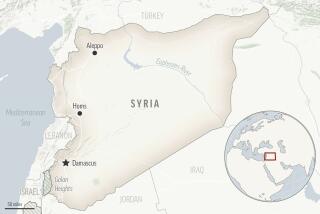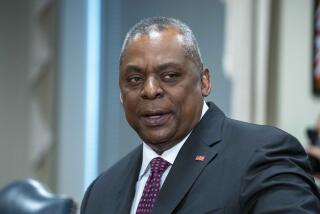Iraqi officials: U.S. captured top Islamic State chemical arms engineer
- Share via
reporting from BAGHDAD — U.S. special forces captured the head of the Islamic State group’s unit trying to develop chemical weapons in a raid last month in northern Iraq, two senior Iraqi intelligence officials told the Associated Press, the first known major success of Washington’s more aggressive policy of pursuing the jihadis on the ground.
The Obama administration launched the new strategy in December, deploying a commando force to Iraq that it said would be dedicated to capturing and killing Islamic State leaders in clandestine operations, as well as generating intelligence leading to more raids.
U.S. officials said last week that the expeditionary team had captured an Islamic State leader but had refused to identify him, saying only that he had been held for two or three weeks and was being questioned.
The two Iraqi officials identified the man as Sleiman Daoud al-Afari, who worked for Saddam Hussein’s now-dissolved Military Industrialization Authority where he specialized in chemical and biological weapons. They said al-Afari, who is about 50 years old, heads the Islamic State group’s recently established branch for the research and development of chemical weapons.
NEWSLETTER: Get the day’s top headlines from Times Editor Davan Maharaj >>
He was captured in a raid near the northern Iraqi town of Tal Afar, officials said. They would not give further details.
The officials, who have both first-hand knowledge of the individual and of the Islamic State chemical program, spoke on condition of anonymity as they are not authorized to brief the media. No confirmation was available from U.S. officials.
Beyond intelligence value, the capture could strike a blow to what Iraqi and American officials have described as a determined effort by the terror group to develop chemical weapons.
The jihadi group was believed to have set up a special unit dedicated to chemical weapons research, made up of Iraqi scientists from the Saddam-era weapons program as well as foreign experts who joined the group. Iraqi officials expressed particular worry over the campaign because Islamic State gained so much room to operate and hide chemical laboratories after overrunning around a third of the country in the summer of 2014, joined with territory they controlled in neighboring Syria.
The group is believed to have created limited stocks of mustard gas. Iraqi officials say it has ambitions to develop more dangerous agents such as nerve gas, though the U.S. has said it appears far from that goal. Tests confirmed mustard gas was used in a town in Syria when Islamic State was launching attacks there in August 2015. Other unverified reports in both Iraq and Syria accuse the terror group of using chemical agents on the battlefield.
See more of our top stories on Facebook >>
The United States has been leading a coalition waging airstrikes against Islamic State in Iraq and Syria for more than a year. The campaign has been key to backing Iraqi and Kurdish forces that have slowly retaken significant parts of the territory the militants had seized.
But after coming under pressure at home for greater action against the militants, the Obama administration moved to the tactic of stepped up commando operations on the ground.
Last year, U.S. special forces killed a key Islamic State leader and captured his wife in a raid in Syria, but the new force in Iraq was intended as a more dedicated deployment. American officials have been deeply secretive about the operation. Its size is unknown, thought it may be fewer than 100 troops.
“This is a no-kidding force that will be doing important things,” was about all Defense Secretary Ash Carter would say about the force in testimony to the Senate Armed Services Committee in December.
More to Read
Sign up for Essential California
The most important California stories and recommendations in your inbox every morning.
You may occasionally receive promotional content from the Los Angeles Times.












